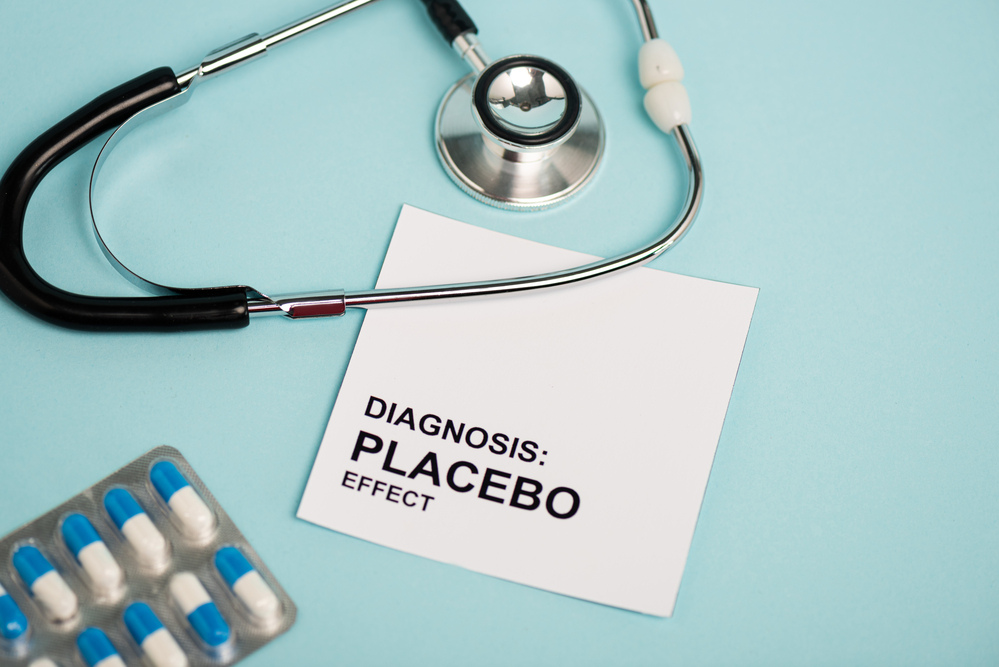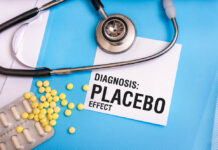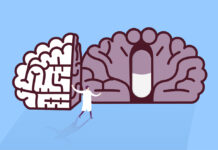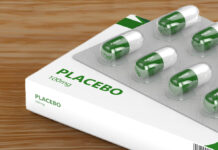In a new article in Lancet Psychiatry, researcher Matt Burke at the University of Toronto draws attention to powerful results in the placebo group in psychiatric trials. He notes that a recent brain stimulation study for depression found that more people improved in the sham (placebo) treatment group.
“We often ignore placebo effects as a nuisance… but the more we learn about the brain, the clearer it becomes that we have missed the boat,” Burke wrote on Twitter.
The brain stimulation study was also published in Lancet Psychiatry and was led by Richard Morriss at the University of Nottingham, UK. In that study, all participants had moderate to severe depression and had already taken antidepressants without success, and about three-quarters had clinical anxiety as well. Strikingly, 42% of the participants achieved full remission from depression in the sham (placebo) group, compared with only 30% in the group that received actual brain stimulation.
The difference was statistically significant—favoring the placebo group—in several analyses, including “in self-rated depression at 4 and 16 weeks, in generalized anxiety at four weeks, and in overall health at 16 weeks.” The results favored the placebo group in all of the analyses, even those that did not reach statistical significance.
Thus, the study showed that even after a failed trial of antidepressants, 42% of moderately to severely depressed people improved without receiving any actual treatment—and those who did receive treatment did worse.
 According to Burke, the researchers in the brain stimulation trial “do not consider more deeply how the placebo response might have contributed to the beneficial effect of sham stimulation.”
According to Burke, the researchers in the brain stimulation trial “do not consider more deeply how the placebo response might have contributed to the beneficial effect of sham stimulation.”
However, although the brain stimulation article doesn’t use the word “placebo,” it includes a detailed discussion of possible reasons for the improvement in the sham treatment group, including regression to the mean, increased hope of improvement, the support of seeing researchers and clinicians, and that even the sham group involved having a relaxing and structured day, which may have similar effects to behavioral activation, a type of psychotherapy.
“The act of planning the day and devoting 1 h per day for personal relaxation for up to 8 weeks might have been of some clinical benefit. People with depression typically have low motivation to do activities that might be rewarding to them, and they put the needs of others before themselves. Structuring the day to do a relaxation task, such as Alpha-Stim AID, that increases a sense of control or pleasure might be construed as compatible with behavioural activation, an effective psychological treatment for depression. However, unlike behavioural activation, with Alpha-Stim AID there was no progressive increase in activities over time. Other reasons for the substantial decrease in depression over time in both groups might have been regression to the mean, benefits of support from the research team, or hope engendered by participating in a novel intervention trial.”
Despite these psychosocial explanations, Burke focuses on the notion that the placebo effect may rewire the very “brain circuits” theorized to be involved in psychiatric problems. He cites the example of Parkinson’s disease but does not cite any examples from the psychiatric diagnoses at play here—depression and anxiety—presumably because while Parkinson’s disease has known biological correlates, depression and anxiety do not.
“A crucial point is that placebo responsiveness does not make a symptom or disorder any less real or biological. Instead, placebo responsiveness means that pathophysiology likely overlaps with brain or brain-body circuits that can be modulated by placebo effects. Placebo-induced ventral striatum dopamine release resulting in symptomatic improvement of dopamine-deficient patients with Parkinson’s disease is a prime example.”
Another explanation, though, is that hope, support, and relaxing, structured activities have a psychological effect on psychological distress—an effect that perhaps does not need to be over-complicated by unsubstantiated theories about how these affect “brain or brain-body circuits.”
Additionally, as the original authors point out—and Burke does not mention—regression to the mean could be a key factor here. When you take a snapshot of people at their worst, it’s likely that another snapshot (say, at follow-up 16 weeks later) will show them doing much better. This is particularly true for psychiatric diagnoses like depression and anxiety, which are transient when untreated.
One of the issues that neither the article by Burke nor the original brain stimulation piece addressed is why the brain stimulation group did worse than the placebo on every measure. This implies that the treatment is doing more harm than good.
This is interesting in the context of antidepressant drugs as well, which have repeatedly been shown to be no better than the placebo in clinical trials, and which, in the long-term, have demonstrated worse outcomes in those who take them than in those who receive no treatment, even after controlling for baseline severity.
Burke goes as far as suggesting that failed trials—those that show a drug or device failing to beat the placebo—may not be “failures” at all. Instead, he suggests that perhaps the placebo effect and the drug/device have the same biological effect on the same brain systems!
“Psychiatrists should realise that treatment trials like Alpha Stim Anxiety Insomnia and Depression are not failing (in a literal sense) as both groups showed impressive and clinically meaningful improvements in their symptoms. The failure lies in the use of conventional measurements of efficacy that assume a categorical divide between the value of brain changes generated by placebo effects and brain changes generated by specific treatments.”
It would be fascinating to see a study investigating such an interesting speculation.
Ultimately, according to Burke, researchers need to investigate the placebo effect more thoroughly.
“A structured framework for appraisal and systematic collection of data relevant to placebo responses (e.g., patient expectancy and blinding integrity measures) should be established,” he writes.
****
Burke, M. J. (2023). A fundamental change is needed for appraising placebo responses in psychiatry. Lancet Psychiatry, 10(5), 316-317. DOI: https://doi.org/10.1016/S2215-0366(23)00068-8 (Link)
Morriss, R., Patel, S., Boutry, C., Patel, P., Guo, B., Briley, P. M., . . . & Kai, J. (2023). Clinical effectiveness of active Alpha-Stim AID versus sham Alpha-Stim AID in major depression in primary care in England (Alpha-Stim-D): A multicentre, parallel group, double-blind, randomised controlled trial. Lancet Psychiatry, 10(3), 172-183. DOI: https://doi.org/10.1016/S2215-0366(23)00007-X (Link)















I reckon this article of Peter’s may be one of the most pregnant and prescient in the history of MIA, and I feel most extremely grateful for it, thank you.
The placebo effect, as we come to understand it better, can explain how Jesus, Bruno Groening ( https://www.youtube.com/watch?v=ZNlXuclHhVc ) or any other faith healer has ever helped others achieve the healing they needed, when as as they needed it.
At Min. 40:43 – 41:35 of this,
https://www.youtube.com/watch?v=qINdA6E14Sk
(Professor, pediatrician and more) Howard Schubiner offers one definition of placebo.
(I do not share Howard’s apparent skepticism regarding “alternative” modalities, in general, and I doubt acupuncture practitioners speak of “unbalanced chi.” For all I know, perhaps we do have chakras, and if fear/stress can knock them somehow out of alignment and interfere with the flow of one’s chi, then hope/placebo/reassurance may help us realign them and restore optimal flow, and the wellbeing which accompanies it?)
At Min. 37:59 – 38:08 of it
https://www.youtube.com/watch?v=qINdA6E14Sk ,
Howard confirms that he is a faith healer.
Backed up by conventional “bio-technical medicine”, which he especially exploits to FIRST help rule out any ongoing structural (“somatic”) problems as a cause of pain, he helps folks heal themselves primarily by using the placebo effect as powerfully – as empathetically, compassionately, lovingly and scientifically, I would say – as he can.
Between approx. Min. 22:58 and 24:07 of it
https://www.youtube.com/watch?v=qINdA6E14Sk ,
Howard offers an explanation for how we humans may have learned/evolved to experience physical chronic pain/fatigue/”anxiety-depression” when our negative emotions have been reactivated. Elsewhere, he refers to our “shame” (or feelings of “sin/sinfulness”) when we experience negative emotions.
It is easy to see how and why, long before writing evolved, tribal elders might have drawn any numbers of “commandments” or unwritten rules of behavior simply to keep (mostly younger) folks obedient, compliant, “well-behaved.”
While I don’t even pretend to know that Jesus of Nazareth even lived, I do like to believe that, challenged by a scribe (a member of the prevailing authority), his spontaneous retort was very much along the lines of
“Which is easier: to say, ‘Your sins are forgiven,’ or to say, ‘Get up and walk’?” (Matthew 9:5).
(Also, reportedly, such suggestions as “all things are possible to one who believes,” “such things you shall do and greater, too” etc. etc.)
It intrigues me that the man was not quoted as having said “I forgive you your ‘sins’ or sins,’” but rather that they had been forgiven – perhaps even with the implication that they had been fore-given – given him in advance – and that the very idea that we are inherently sinful, flawed, defective, unworthy, inadequate for whatever tasks await us or miscreants is a false notion which only serves us until we no longer require it, and are ready to forgive and so to heal ourselves and so others?
‘“We often ignore placebo effects as a nuisance… but the more we learn about the brain, the clearer it becomes that we have missed the boat,” Burke wrote on Twitter.’
I think Matt mixed his metaphors and meant point not boat, perhaps?
I also think that, often, when we look for and fail to see the point of things, it is because there is not a point or even line or direction or plane or even sphere of influence or dimension there, as a force or tide, and more.
If, as I believe, the placebo effect is the most potent and pure healing power or force in the cosmos, with no possible harmful “side-effects,” while it is so vast and so obvious and, thus far, so misunderstood by contemporary medicine, and while I can see how we may fail to even identify, let alone to explain it, I can’t see how we can actually ever miss it as “the boat” when it is that (infinite and eternal) tide of hope which floats all our boats: we may catch it at any moment.
I think Shakepeare’s murderous Brutus was deceived by fear (and into haste, as who has not been?) when he said,
“There is a tide in the affairs of men
Which, taken at the flood, leads on to fortune;
Omitted, all the voyage of their life
Is bound in shallows and in miseries.
On such a full sea are we now afloat;
And we must take the current when it serves,
Or lose our ventures.”
We can catch the flood tide any moment we choose to, and perhaps most surely by trying to help one another to do just that, turning life from tragedy to comedy at any moment
(“Comedy = tragedy + time.”)
Bob Whitaker, speaking in Cork, Ireland, memorably pointed out that it can be hard to say whether one is experiencing “anxiety” OR “depression” at any given (unpleasant) moment.
Whenever hope recedes and fear grows, what enters can hardly be described as anxiety without depression or depression without anxiety, and a deterioration in one’s physical health may be expected, stress being the mother of disease.
When hope/faith/love/peace is replenished, as it is through placebo effects, fear recedes and healing progresses.
Running fearful neural circuits in our brains harms our health. Running hopeful ones heals us.
While all placebo effects boost hope, I suspect there may be no limit to the number of different ways in which that ultimate effect is achieved, so that a more accurate diagnosis might always be not “placebo effect,” but “placebo effect/s.”
A million thanks, and more, to Peter and to MIA for such a tremendous article, and to Matt Burke and all those involved in those trials, also.
May the Force and the Effect be with you all.
Tom.
I reckon this article of Peter’s may be one of the most pregnant and prescient in the history of MIA, and I feel most extremely grateful for it, thank you.
At Min. 40:43 – 41:35 of this,
https://www.youtube.com/watch?v=qINdA6E14Sk
(Professor, pediatrician and more) Howard Schubiner offers one definition of placebo.
(I do not share Howard’s apparent skepticism regarding “alternative” modalities, in general, and I doubt acupuncture practitioners speak of “unbalanced chi.” For all I know, perhaps we do have chakras, and if fear/stress can knock them somehow out of alignment and interfere with the flow of one’s chi, then hope/placebo/reassurance may help us realign them and restore optimal flow, and the wellbeing which accompanies it?)
At Min. 37:59 – 38:08 of it
https://www.youtube.com/watch?v=qINdA6E14Sk ,
Howard confirms that he is a faith healer.
Backed up by conventional “bio-technical medicine”, which he especially exploits to FIRST help rule out any ongoing structural (“somatic”) problems as a cause of pain, he helps folks heal themselves primarily by using the placebo effect as powerfully – as empathetically, compassionately, lovingly and scientifically, I would say – as he can.
Between approx. Min. 22:58 and 24:07 of it
https://www.youtube.com/watch?v=qINdA6E14Sk ,
Howard offers an explanation for how we humans may have learned/evolved to experience physical chronic pain/fatigue/”anxiety-depression” when our negative emotions have been reactivated. Elsewhere, he refers to our “shame” (or feelings of “sin/sinfulness”) when we experience negative emotions.
It is easy to see how and why, long before writing evolved, tribal elders might have drawn any numbers of “commandments” or unwritten rules of behavior simply to keep (mostly younger) folks obedient, compliant, “well-behaved.”
While I don’t even pretend to know that Jesus of Nazareth even lived, I do like to believe that, challenged by a scribe (a member of the prevailing authority), his spontaneous retort was very much along the lines of
“Which is easier: to say, ‘Your sins are forgiven,’ or to say, ‘Get up and walk’?” (Matthew 9:5).
It intrigues me that the man was not quoted as having said “I forgive you your sins or sins,’” but rather that they had been forgiven – perhaps even with the implication that they had been fore-given – given him in advance – and that the very idea that we are inherently sinful, flawed, defective, unworthy, inadequate for whatever tasks await us or miscreants is a false notion which only serves us until we no longer require it, and are ready to forgive and so to heal ourselves and so others?
‘“We often ignore placebo effects as a nuisance… but the more we learn about the brain, the clearer it becomes that we have missed the boat,” Burke wrote on Twitter.’
If the placebo effect is the most potent and pure healing power or force in the cosmos, with no possible harmful “side-effects,” while it is so vast and so obvious and, thus far, so misunderstood by contemporary medicine, and while I can see how we may fail to even identify, let alone to explain it, I can’t see how we can actually ever miss it as “the boat” when it is that (infinite and eternal) tide of hope which floats all our boats: we may catch it at any moment.
I think Shakepeare’s murderous Brutus was deceived by fear (and into haste, as who has not been?) when he said,
“There is a tide in the affairs of men
Which, taken at the flood, leads on to fortune;
Omitted, all the voyage of their life
Is bound in shallows and in miseries.
On such a full sea are we now afloat;
And we must take the current when it serves,
Or lose our ventures.”
We can catch the flood tide any moment we choose to, and perhaps most surely by trying to help one another to do just that, turning life from tragedy to comedy at any moment
(“Comedy = tragedy + time.”)
Bob Whitaker, speaking in Cork, Ireland, memorably pointed out that it can be hard to say whether one is experiencing “anxiety” OR “depression” at any given (unpleasant) moment.
Whenever hope recedes and fear grows, what enters can hardly be described as anxiety without depression or depression without anxiety, and a deterioration in one’s physical health may be expected, stress being the mother of disease.
When hope/faith/love/peace is replenished, as it is through placebo effects, fear recedes and healing progresses.
Running fearful neural circuits in our brains harms our health. Running hopeful ones heals us.
While all placebo effects boost hope, I suspect there may be no limit to the number of different ways in which that ultimate effect is achieved, so that a more accurate diagnosis might always be not “placebo effect,” but “placebo effect/s.”
A million thanks, and more, to Peter and to MIA for such a tremendous article, and to Matt Burke and all those involved in those trials, also.
May the Force and the Effect be with you all.
Tom.
Report comment
Removed for moderation.
Report comment
“A structured framework for appraisal and systematic collection of data relevant to placebo responses (e.g., patient expectancy and blinding integrity measures) should be established.”
There should be a “study” on “researchers” who refuse to accept what most people instinctively know.
Report comment
The Burke research article and 75 plus years of research finds that an inert placebo is as or more effective than psychiatric drugs in treating the full range of depressive disorders. How, then, can psychiatry continue to convince the medical profession and the general public that depression is a brain disease and drugs are its primary and effective treatment? However, for over 3,000 years healers and the general public believed that bloodletting was the best treatment for dozens of health problems including the black plague. Psychiatry leads the medical profession in back end treatment and when are we going to start treating the non-organic, psychosocial and life situation difficulties that give rise to distressing symptoms?
Report comment
This, it seems, is a huge step forward in the field of psychiatry!
To seriously study the placebo effect could significantly disrupt the whole mental health system.
I doubt they will actually do it.
Report comment
They never want to admit the significance of the placebo effect. BELIEF can be more powerful than actual physical phenomena in the body! How much MORE causative can belief be over mental phenomena?
You’re right, they can’t really study it honestly. They can’t afford to let the results get out!
Report comment